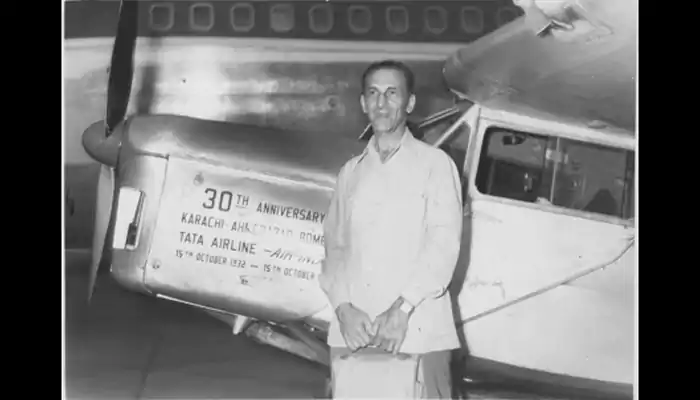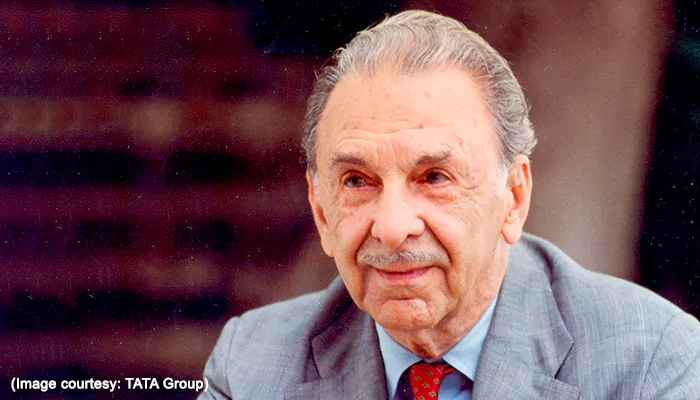J.R.D. Tata's Birth Anniversary: How One Man Kickstarted India’s Industrial Journey
- Sayan Paul
- 7 months ago
- 7 minutes read

J. R. D. Tata was the son of noted businessman Ratanji Dadabhoy Tata.
If India is riding high on the industrial map today, much of the credit goes to J.R.D. Tata. He was a dreamer who turned ideas into industries. From launching India’s first airline to laying the foundation of modern engineering, steel, and science in the country, J.R.D. built the nation’s confidence. At a time when India was still finding its footing, he saw potential in every corner.

To celebrate Tata's 121st birth anniversary, let's understand how he shaped India's entire industrial journey.
Early Life & Formative Influences
Born in Paris to a Parsi father, Ratanji Dadabhoy Tata, and a French mother, Suzanne Brière, J.R.D. grew up surrounded by diverse cultures. His childhood unfolded across France, England, and India, giving him a global perspective that would shape his future leadership.
His education at the Cathedral and John Connon School in Bombay, followed by studies in France and England, immersed him in ideas of enterprise and modern thinking. But the biggest influence came from within the family. His father, a close associate of Tata Group founder Jamsetji Tata, passed on the torch of nation-building. Jamsetji’s dreams of Indian self-reliance in steel, power, and education became young J.R.D. 's lifelong compass.
His love for aviation was sparked early, as he was fascinated by French aviator Louis Blériot, the first man to fly across the English Channel. This blend of global exposure, Indian values, and daring ambition shaped the visionary leader J.R.D. would become.
Leadership at Tata Group
In 1938, at just 34, J.R.D. Tata became the chairman of the Tata Group, a business still in its formative years. Over the next five decades, he transformed it into one of India’s largest and most respected industrial empires.
J.R.D. brought in a new style of leadership, rooted in meritocracy, professionalism, and ethics. At a time when most businesses in India were still family-run, he emphasized transparency and long-term vision over short-term gain.
On the 117th birth anniversary of our visionary leader, J.R.D. Tata, we promise to continue his legacy & strive for excellence as we work towards our vision of #EngineeringABetterWorld for all our stakeholders, including the communities we serve. https://t.co/aTao8QCp8h #JRDTata pic.twitter.com/yoGuse7tr3
— Tata Technologies (@TataTech_News) July 29, 2021
(Credit: Tata Technologies)
He was also decades ahead in terms of employee welfare. Under his leadership, Tata companies introduced benefits like paid leave, medical care, and workplace safety, well before they became law. “I don’t want India to be an economic superpower,” he once said, adding, “I want India to be a happy country.” That single quote speaks volumes about his priorities: building institutions that uplift people and future generations.
Major Contributions to Indian Industry
Aviation Pioneer: J.R.D.’s love for flying turned into a historic first in Indian aviation. In 1932, he founded Tata Airlines, India’s first commercial airline. Not content to simply own it, he became the first Indian to earn a commercial pilot’s license and personally flew the inaugural mail flight from Karachi to Bombay in a single-engine Puss Moth.
He wasn’t in it for fame; he understood that air connectivity could unify a vast, diverse country. Tata Airlines evolved into Air India in 1946, and even after it was nationalized in 1953, J.R.D. remained at the helm. He upheld high standards, often conducting surprise inspections himself.
To him, aviation was about connecting people, ideas, and opportunities across India’s wide landscape.
Steel, Science & Technology: Under J.R.D.’s leadership, Tata Steel (Jamsetji’s original dream) grew into Asia’s first integrated steel plant, powering the nation’s infrastructure. Railways, bridges, and factories all bore the stamp of Tata Steel.
But J.R.D. didn’t stop at steel. He launched Tata Motors in 1945, bringing India its first indigenous cars and trucks. He started Tata Chemicals to support agriculture and industry, and formed partnerships with international firms like Mercedes-Benz.
And long before "IT" became a buzzword, J.R.D. backed the creation of Tata Consultancy Services (TCS) in 1968, laying the foundation for India’s future as a global tech hub. His vision always looked decades ahead, aligning business growth with national development.
Vision for Education & Research: For J.R.D., industry without science was like a body without a brain. He believed knowledge was key to self-reliance, and acted on that belief.
In 1945, he founded the Tata Institute of Fundamental Research (TIFR) in Bombay, which went on to nurture scientific legends like Homi Bhabha and contribute to India’s nuclear and space programs. He was also a long-time supporter of the Indian Institute of Science (IISc) in Bangalore, helping it grow into one of India’s premier research hubs.
Jawaharlal Nehru with Homi J. Bhabha and J. R. D. Tata in a discussion at Tata Institute of Fundamental Research (TIFR). pic.twitter.com/XQwtUiWkbZ
— Nehruvian (@_nehruvian) June 9, 2023
(Credit: Nehruvian)
“Excellence demands aiming for perfection,” he once said. And that mindset drove his investments in education and research, ensuring India could not just manufacture goods but also innovate and lead on the global stage.
Labour Reforms & Welfare: J.R.D. was a pioneer in employee welfare long before it became the norm. In the 1930s, he introduced maternity leave, accident insurance, and free healthcare for Tata employees, which were unheard of at the time.
He advocated for the eight-hour workday and instituted provident funds. His approach was simple: Dignity at work matters. On one visit to the Tata Steel plant in Jamshedpur, he noticed workers’ housing lacked basic facilities. He immediately ordered improvements, stating, “If we can’t care for our people, what’s the point of our wealth?”
For J.R.D., a successful company was about the well-being of the people who built it.
Philosophy and Leadership Style
J.R.D. led with strength, humility, and integrity. “Live cleanly, simply, and honestly,” he often advised people. Despite being one of the most powerful men in India, he was approachable, warm, and deeply respectful of his employees.
He had a habit of walking the factory floors, chatting with workers by name. His dedication was legendary: he routinely put in 14-hour workdays, yet never lost his human touch.
J.R.D. Tata believed #leadership begins with affection and he led with it. A reminder for every leader today.
— Michael Virardi (@Michael_Virardi) June 29, 2025
As you wake up tomorrow to the start of a new week, heading to work (or to battle), keep this in mind.#MVirardi 🇮🇳 @TataCompanies pic.twitter.com/IaTBUJFxDu
(Credit: Michael Virardi)
He refused to compromise on ethics, even when it meant turning down lucrative deals. “I don’t want Tata to be the biggest company,” he famously said once, adding, “I want it to be the best.” That mindset shaped not only the Tata legacy but also set a gold standard for corporate India.
During his 50-year leadership, the Tata Group grew from 14 companies to over 80, spanning steel, automobiles, technology, and more. But more than expansion, it was J.R.D.’s commitment to values that made Tata a name synonymous with trust.
In 1992, he was awarded the Bharat Ratna, India’s highest civilian honor and the first ever given to an industrialist.












